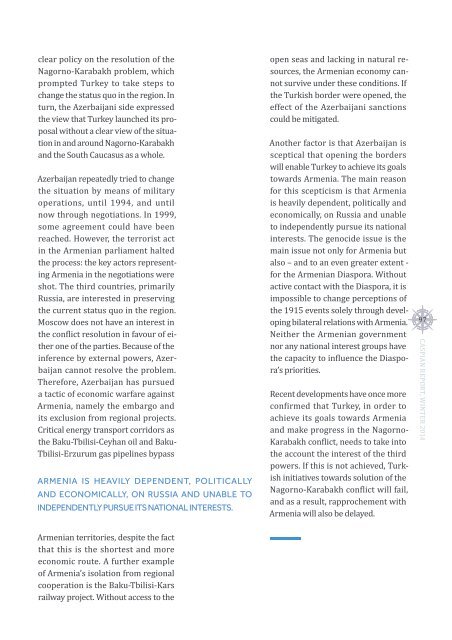Caspian Report - Issue 06 - Winter 2014
You also want an ePaper? Increase the reach of your titles
YUMPU automatically turns print PDFs into web optimized ePapers that Google loves.
clear policy on the resolution of the<br />
Nagorno-Karabakh problem, which<br />
prompted Turkey to take steps to<br />
change the status quo in the region. In<br />
turn, the Azerbaijani side expressed<br />
the view that Turkey launched its proposal<br />
without a clear view of the situation<br />
in and around Nagorno-Karabakh<br />
and the South Caucasus as a whole.<br />
Azerbaijan repeatedly tried to change<br />
the situation by means of military<br />
operations, until 1994, and until<br />
now through negotiations. In 1999,<br />
some agreement could have been<br />
reached. However, the terrorist act<br />
in the Armenian parliament halted<br />
the process: the key actors representing<br />
Armenia in the negotiations were<br />
shot. The third countries, primarily<br />
Russia, are interested in preserving<br />
the current status quo in the region.<br />
Moscow does not have an interest in<br />
the conflict resolution in favour of either<br />
one of the parties. Because of the<br />
inference by external powers, Azerbaijan<br />
cannot resolve the problem.<br />
Therefore, Azerbaijan has pursued<br />
a tactic of economic warfare against<br />
Armenia, namely the embargo and<br />
its exclusion from regional projects.<br />
Critical energy transport corridors as<br />
the Baku-Tbilisi-Ceyhan oil and Baku-<br />
Tbilisi-Erzurum gas pipelines bypass<br />
ARMENIA IS HEAVILY DEPENDENT, POLITICALLY<br />
AND ECONOMICALLY, ON RUSSIA AND UNABLE TO<br />
INDEPENDENTLY PURSUE ITS NATIONAL INTERESTS.<br />
open seas and lacking in natural resources,<br />
the Armenian economy cannot<br />
survive under these conditions. If<br />
the Turkish border were opened, the<br />
effect of the Azerbaijani sanctions<br />
could be mitigated.<br />
Another factor is that Azerbaijan is<br />
sceptical that opening the borders<br />
will enable Turkey to achieve its goals<br />
towards Armenia. The main reason<br />
for this scepticism is that Armenia<br />
is heavily dependent, politically and<br />
economically, on Russia and unable<br />
to independently pursue its national<br />
interests. The genocide issue is the<br />
main issue not only for Armenia but<br />
also – and to an even greater extent -<br />
for the Armenian Diaspora. Without<br />
active contact with the Diaspora, it is<br />
impossible to change perceptions of<br />
the 1915 events solely through developing<br />
bilateral relations with Armenia.<br />
Neither the Armenian government<br />
nor any national interest groups have<br />
the capacity to influence the Diaspora’s<br />
priorities.<br />
Recent developments have once more<br />
confirmed that Turkey, in order to<br />
achieve its goals towards Armenia<br />
and make progress in the Nagorno-<br />
Karabakh conflict, needs to take into<br />
the account the interest of the third<br />
powers. If this is not achieved, Turkish<br />
initiatives towards solution of the<br />
Nagorno-Karabakh conflict will fail,<br />
and as a result, rapprochement with<br />
Armenia will also be delayed.<br />
97<br />
CASPIAN REPORT, WINTER <strong>2014</strong><br />
Armenian territories, despite the fact<br />
that this is the shortest and more<br />
economic route. A further example<br />
of Armenia’s isolation from regional<br />
cooperation is the Baku-Tbilisi-Kars<br />
railway project. Without access to the










